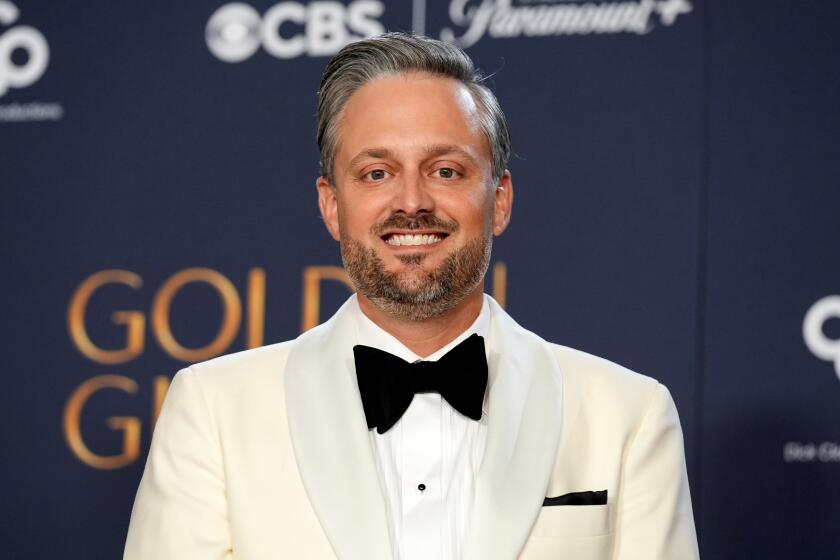The more things change
- Share via
It’s Emmy week (can you feel it? Because I can feel it). Maybe the reason I can feel it and you can’t is that I’m part of the print media covering the Emmys, which involves renting a tuxedo and sitting in a special tent next to the Shrine Auditorium, where for a period of several hours, staggered like subways, the winners of Emmys come through and stand on a stage, answering questions (“Helen! Helen Hunt! What’s your favorite beauty product?” still rings in my ears). From what I can gather by watching C-SPAN, it’s kind of like covering a State Department briefing on the progress in Iraq, except for the fact that it’s the very opposite of this.
Martin Mull, I believe, is the one who described show business as “high school with money.” The analogy is a good one for backstage on Emmy night: The stars comprise the cool crowd, while people like “Entertainment Tonight’s” Mary Hart and Bob Goen are the cool-crowd wannabes, the kids who wear what the stars wear and help them cheat on their Spanish tests. The rest of us, in our ill-fitting formal clothes, are who we are -- slovenly people herded into a tent.
In high school, I was one of the slovenly people herded into a tent, a fact that I have been forced to confront lately because my 20-year reunion is being held next month.
I went to Beverly Hills High School, home of the fighting Normans. The form I received in the mail wants $85 for an advance ticket. It wants, or purports to want, information -- about my life and such, since 1983. This, it seems to me, can encourage what the psychological community calls a “comparison trip.”
And so I thought about ignoring the form and scalping an identity outside the hotel, the night of the reunion. Reunions should have scalpers and ticket brokers. I picture unshaven, middle-aged men in windbreakers, lingering around the Sofitel in West Hollywood selling a variety of options: 100 bucks to go as a drama geek, 150 for high school quarterback, 200 to be the guy who dabbled in drugs and ended up graduating via correspondence because he went off in a van with a rag-tag group of environmental extremists (one of whom bore a striking resemblance to Kate Winslet), and who has since sold his life rights to Miramax for a bundle. He lives half the year in a part of Hawaii you haven’t heard of, and which requires two taxis and a burro to access.
The default plan is simply to go as somebody who still has his hair (I could stay home and just send my hair to the reunion, but logistically this would be a nightmare). Going to a reunion involves running into people you haven’t seen in a while, and most especially yourself -- who you are now, who you were then. I’m looking forward to the walk-in, which seems like it should be kind of a red carpet moment, an awards ceremony entrance where the award is ambiguous but the moment is charged. Have I made it? What is making it? What, precisely, is the best way to hold my body so that it communicates “I don’t care”? Is there a tailor who will adjust a suit to express this?
These are, after all, some of the very first people who ever judged you.
And sometimes you don’t have to have a reunion. Not long ago, on the front page of the California section of The Times, there was a story that caught my eye. “Robert Marcucci Jr.’s death drew laughs from the gang members who allegedly chased him down and bludgeoned him with a concrete block,” it began.
That a former schoolmate had died a drug addict on a Los Angeles street stopped me, but what was chilling was the manner in which Marcucci’s death was described. “Pursued by several gang members who confronted him along Rimpau Boulevard,” the story said, “his attackers stood over him, police said, chuckling as he writhed.”
An indelible image appeared: Marcucci in elementary school, in virtually the same predicament, minus the drugs and the concrete block and the fatal ending. I saw the 11-year-old Marcucci, picked on and chased and punched. He was lumpy and whiny, sweet underneath the annoying parts, I think, but a born victim.
His dad, some of us knew, was a producer, but that evidently offered no protection. Once, he thanked me for not participating in our ritualistic hazing, and I can remember how much I hated him for thanking me. If Marcucci was the guy who invited our abuse, the kid who seemed to exist to be punched and taunted, who was I, that I was earning his gratitude? He could have it.
And here he had died, apparently chased down and laughed at and struck, the context different from the person I had known, but seemingly not much else. In a movie, the symmetry would be too much -- between my image of the 11-year-old kid and the image of the 38-year-old man conjured up by the news story. Two people being chased, one down an elementary school hallway, the other down a Mid-City street. In both scenes, Marcucci is screaming, and we are laughing.
People change and yet they don’t. Like that. I have no memory of Robert Marcucci at Beverly Hills High School. I guess I lost track of him.
Paul Brownfield can be contacted at paul.brownfield@latimes.com.
More to Read
The complete guide to home viewing
Get Screen Gab for everything about the TV shows and streaming movies everyone’s talking about.
You may occasionally receive promotional content from the Los Angeles Times.






